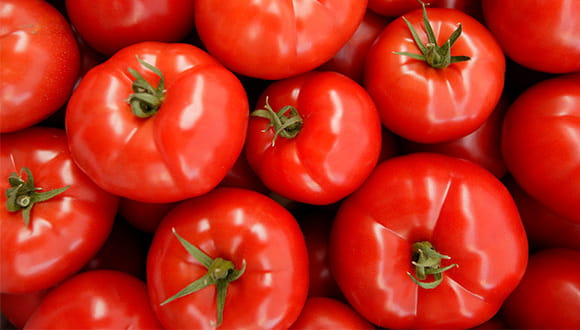Tomatoes & Other Nightshades: Are They Actually Bad for You?
Sep. 7, 2021 - Katie McCallumThere are some food items you're probably not surprised to learn aren't exactly considered "healthy" — especially when consumed in excess. Coffee drinks. Cured meats. Packaged foods marketed as being low fat. Certain condiments, like honey mustard and mayo.
Then there are ... tomatoes? Yes, tomatoes. At least, there's a new hysteria surrounding them.
"A few popular reactionary doctors and a notable NFL star (ahem, Tom Brady) have brought a nightshade phobia into the mainstream, so much so that the healthfulness of tomatoes has been called into question," says Amanda Beaver, wellness dietitian at Houston Methodist.
At first thought, it seems bizarre. Tomatoes? Bad for you?
But when a seemingly healthy food item gets stiff-armed by a 44-year old athlete who happens to be coming off his seventh Super Bowl winning season, the seed of doubt gets planted.
"Try searching nightshades and nutrition and you will likely walk away feeling just as confused as before," adds Beaver.
So — before you even start thinking about putting that tomato down — let's let Beaver, a nutrition expert, explain what we need to know about nightshades.
What are nightshades exactly?
Pre TB-12-tomato-hysteria, most of us probably hadn't even heard of nightshades.
"Nightshades consist of a huge number of plants that share a few common characteristics," says Beaver. "Scientists refer to this plant family as Solanaceae. You may actually have some nightshades in your garden, such as petunias. Only a few of these plants are commonly eaten by people, but they include some of the most-eaten veggies in America."
Common examples of nightshades that we eat include:
- White potatoes
- Tomatoes
- Eggplant
- Bell pepper
- Chili peppers
- Tomatillos
- Goji berries
"You'll likely find nightshades in some of your favorite kitchen ingredients, such as marinara sauce, red salsa, salsa verde, ketchup, hot sauce, paprika and anything with chili powder," says Beaver.
So, now that we know what they actually are, it's time to address how nightshades affect the body and why these common foods might be perceived as unhealthy.
So ... are nightshades actually bad for you?
On the topic of why they might be bad, Beaver is quick to say, "There's no evidence that eating nightshade veggies causes any health problems for people."
In fact, she points out that edible nightshade veggies — including tomatoes, bell peppers, or eggplant — are the opposite of bad for you, they're beneficial! These veggies contain tons of important nutrients and anti-inflammatory compounds.
"For example, tomatoes are rich in lycopene, an antioxidant compound that is thought to have anticancer properties and may play a role in skin health," explains Beaver. "Bell peppers are rich in vitamin C, an antioxidant important for immune health. And potatoes are great sources of potassium, a vitamin most American's don't get enough of."
People suspicious of nightshades often cite a group of compounds found in some nightshades called alkaloids.
"Some of the alkaloids found in common nightshades can cause GI distress and even be poisonous to people, but only when consumed in excess or when eating these foods in unusual ways — such as eating a tomato's leaves or a potato after it's turned green," says Beaver. "Plus, alkaloids exist in non-nightshade foods, too, such as coffee, tea, and chocolate. And I'm sure you want to keep one or more of those in your diet."
Put another way, a typical American diet that includes plenty of edible nightshade veggies does not contain large or harmful amounts of alkaloids.
But can nightshades cause joint pain or inflammation?
There's another misconception out there about tomatoes and other nightshades: That they cause inflammation. (Spoiler: They don't.)
"People with autoimmune diseases such as rheumatoid arthritis may worry that these foods can lead to gut problems and, thus, worsen inflammation, but there's no evidence to support this fear," says Beaver.
In fact, the recommended diet for people with arthritis is one rich in veggies and fruits, as these contain countless anti-inflammatory compounds.
"Those who have irritable bowel disease (IBD), another autoimmune condition, may worry that the types of alkaloids in nightshades could aggravate their already inflamed GI tract," adds Beaver. "But there's no evidence that tomatoes or bell peppers makes IBD symptoms worse."
Those with autoimmune conditions who think they may have food intolerances should work with a registered dietitian and their doctor.
"Your doctor or dietitian can guide you through figuring out which foods might be triggering your symptoms, all while making sure you're still getting the nutrients you need," recommends Beaver.
And, in general, Beaver recommends always being wary of anyone trying to sell you a supplement or some other type of cure-all.
"Plus, for most Americans, the last thing we need to be cutting out of our diets are veggies," says Beaver.








